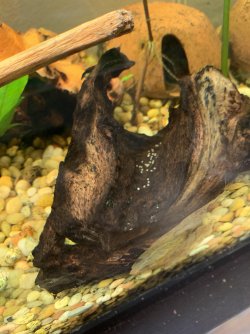kribensis12
I know where you live
Hey,
Quick Question from the community:
I've got a pair of Rams (gorgeous Golden Ram and a blue ram) and the female's ovipositor tube has been descending, ascending, and descending for the past 2 weeks (she is also very plump and . I have not seen the males parts descend at all.
Any clue why they seem to be so indecisive? I've been feeding them blood worms (freeze dried, gut loaded), spirulina flakes and omega one color flakes.
Quick Question from the community:
I've got a pair of Rams (gorgeous Golden Ram and a blue ram) and the female's ovipositor tube has been descending, ascending, and descending for the past 2 weeks (she is also very plump and . I have not seen the males parts descend at all.
Any clue why they seem to be so indecisive? I've been feeding them blood worms (freeze dried, gut loaded), spirulina flakes and omega one color flakes.


